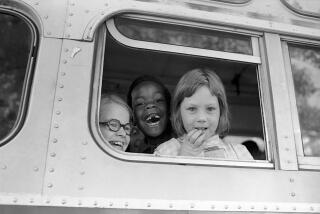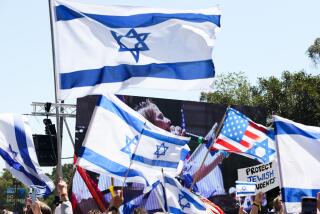Bosnia’s Ethnic Division Relocates to the Classroom
- Share via
SARAJEVO, Bosnia-Herzegovina — When classes opened in the Muslim-Croat half of Bosnia this fall, many teachers began enacting a new set of rules: segregating students based on their ethnicity.
Children and their parents have been told to fill out questionnaires asking their religion. In some schools, students have been told to raise their hands to signal whether they are Muslims or Croats.
Parallel curricula are being taught--Muslim children take one set of courses, Roman Catholic Croatian children another. Minority children in some cases have been removed to separate classrooms. Education Ministry officials who ordered the ethnic polling defend the program as “separate but equal.” Human rights officials and many parents and teachers are outraged, calling it a dangerous attempt to create ethnically pure classrooms and cement Bosnia’s partition.
The division of children and the use of parallel curricula are reported to be the products of a deal struck between the two hard-line ruling parties in the Muslim-Croat Federation, as this half of Bosnia-Herzegovina is known.
“Instead of building joint educational foundations for all Bosnia and Herzegovina . . . we are witnessing [an attempt] by nationalistic leaders to take one step further toward splitting Bosnia and Herzegovina along its ethnic boundaries,” wrote Srdjan Dizdarevic, president of the Bosnian branch of the Helsinki Committee for Human Rights, in a protest letter.
International officials say the plan violates the spirit, and perhaps the letter, of December 1995 U.S.-brokered peace accords that ended Bosnia’s 3 1/2-year war--a conflict in which religion was used as a pretext for fighting and for the “ethnic cleansing” that purged regions of hundreds of thousands of people. One of the goals of the accords is to reunite Bosnia’s fractured and once-multiethnic society, but nationalists on all sides continue to fight against reconciliation.
‘Separate but Equal’ Education Claimed
Education Ministry officials insist that the program they are implementing provides for “separate but equal” schooling that will allow the region’s two principal ethnic groups to preserve their cultural identities. No provisions are made for Serbs or other minorities.
“It is their constitutional right to find out everything there is to know about their culture, tradition and history,” Abdulah Jabucar, assistant education minister, said in an interview.
Jabucar allowed, however, that determining students’ religions and then forcing their separation are a clumsy way to guarantee that right.
Parallel education systems, Jabucar said, are actually a holdover from the war, when the Muslim-led Bosnian government used one curriculum while Croats used a system set up by their self-proclaimed ministate of Herceg-Bosna.
Students who take the Bosnian Croat courses are learning the same things taught in neighboring Croatia. They are taught, for example, that their capital is Croatia’s capital, Zagreb--not the Bosnian capital, Sarajevo--and literature is heavy on Croatian writers. They learn about the flora, fauna, rivers and historical development of Croatia.
Bosnia’s Croats, Muslims and Serbs speak roughly the same language, with some regional differences. But nationalists now emphasize the differences to bolster their claim to distinct languages; Bosnian Croat children are taught in “Croatian,” while Muslim children are taught in “Bosnian.”
Muslim children are also taught Islam, which was added to the Bosnian curriculum a couple of years ago as an elective. Jabucar said religion is still an elective, but parents have been told that failure to take it will hurt a child’s overall grade-point average.
Memorizing Sayings From the Koran
Bakir and Amela Arnautovic are Muslims whose 7-year-old daughter, Stela, is taking the curriculum tailored to Muslim children. They complain that she is too young to have to memorize sayings from the Islamic holy book, the Koran. Each evening she repeats the Arabic phrases over and over, scrawling them into a notebook in the large block letters typical of a first-grader.
The Arnautovics would be considered loyal Muslims. They remained in Sarajevo throughout the war, and Bakir, whose grandfather was an Islamic cleric, continues to serve in the Bosnian army under Muslim command. But they believe that politics and religion do not belong in the classroom and that ethnic-based segregation is wrong.
Because Stela does not have a traditionally Muslim name, she was initially separated from her classmates. The teacher realized the mistake after parents were told to produce birth certificates.
“Democracy is supposed to be about the possibility to choose, so if they want democracy here, they have to allow choice,” Bakir said. “Instead they are categorizing people--children--and putting them into one track. I want Stela to learn about all religions, not just one.”
Teachers Have Their Doubts Too
Parents are not the only ones unhappy with the new rules. Quite a few teachers have complained, and some have refused to administer the questionnaires.
“Separating children is a crime,” Muhamed Ganibegovic, director of a teachers school in Sarajevo, told the weekly newsmagazine Svjet. “By attending ethnically pure classes, children are destined for failure. [Muslim] children won’t learn about Christmas. Catholic children won’t know [the Muslim holiday] Bajram. . . . Curriculum has to be created in a way that does not serve daily political purposes.”
Public debate over the ministry plan is filling Bosnian newspapers and radio programs. Ministry officials are said to be worried that the controversy will jeopardize World Bank and other international loans they had hoped to secure.
The International Human Rights Law Group is urging the Education Ministry to suspend its directive. Arguing that there is no such thing as “separate but equal,” especially in a society emerging from war, the law group has warned that segregating children will create feelings of inferiority among minority kids.
“This is not what minority rights are about,” said Sandra Mitchell, the law group’s director in Bosnia. “This is not a step toward reconciliation but a step toward partition, and it’s very, very dangerous.”
More to Read
Sign up for Essential California
The most important California stories and recommendations in your inbox every morning.
You may occasionally receive promotional content from the Los Angeles Times.














